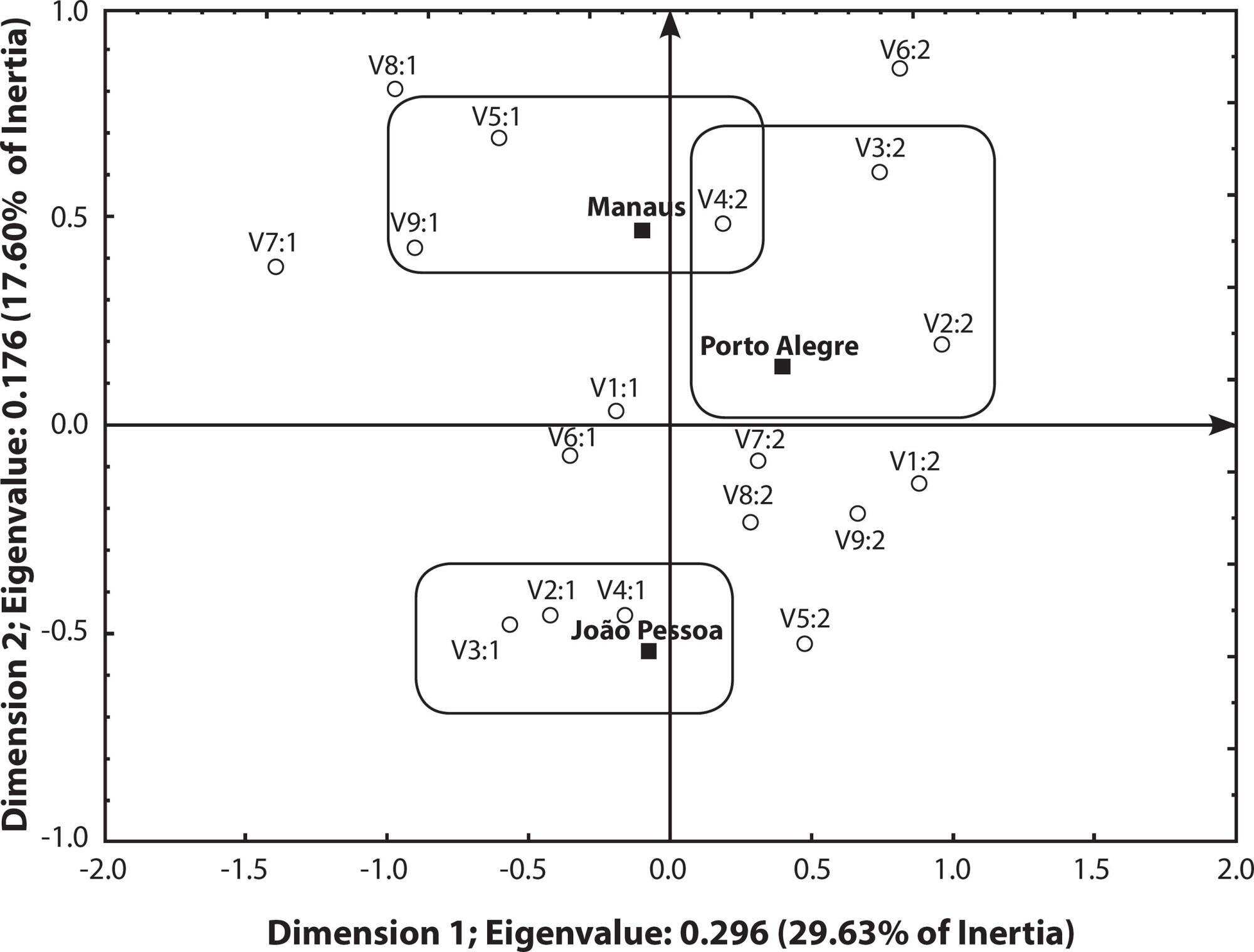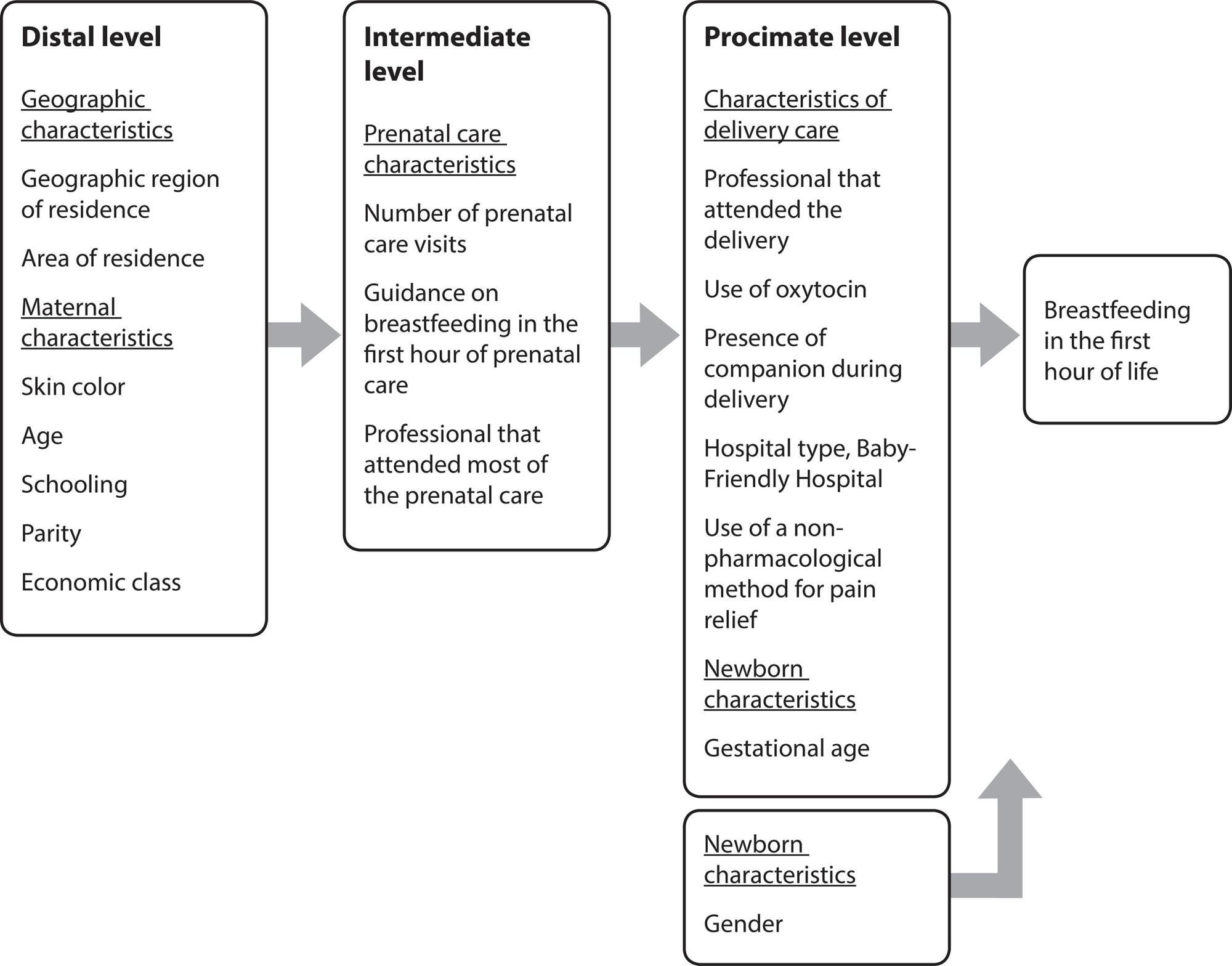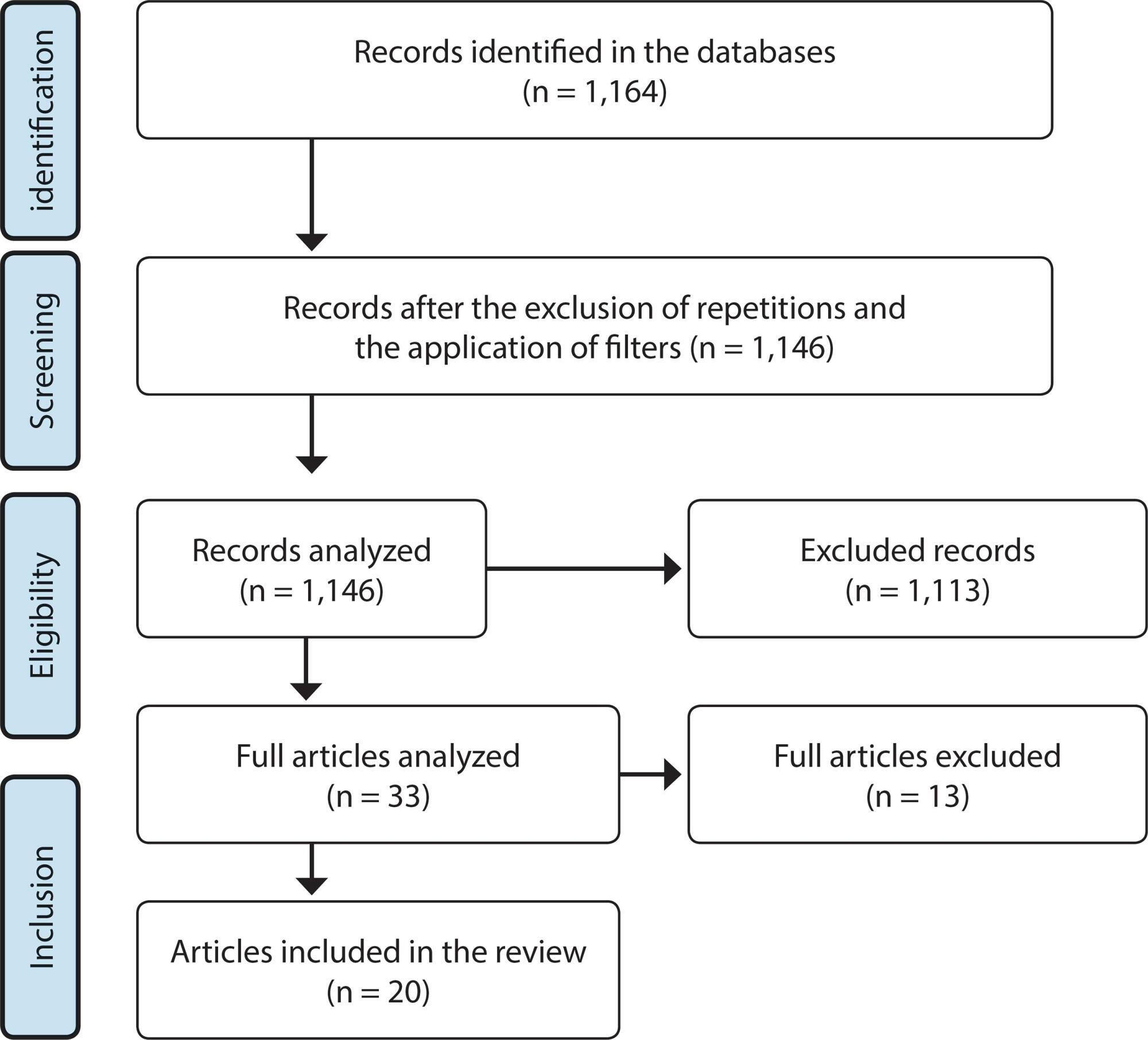-
ORIGINAL ARTICLE11-22-2024
Transitions experienced by people living with limitations resulting from leprosy: a research-care study
Revista Brasileira de Enfermagem. 2024;77(5):e20230229
Abstract
ORIGINAL ARTICLETransitions experienced by people living with limitations resulting from leprosy: a research-care study
Revista Brasileira de Enfermagem. 2024;77(5):e20230229
DOI 10.1590/0034-7167-2023-0229
Views0See moreABSTRACT
Objective:
to understand the transitional processes that affect the adaptation of people who live with limitations resulting from leprosy.
Methods:
This is a qualitative study based on the precepts of Transition Theory, mediated by care-research, with 24 people with limitations resulting from leprosy in an ex-hospital colony in Piauí. Semi-structured interviews were carried out. The interviews were analyzed using Iramuteq software.
Results:
the researched-caregivers experienced the four types of transitions, including feelings of fear, worry, loneliness, hopelessness, guilt and a tendency to hide the diagnosis. Breakdowns and resignation were revealed, with spirituality, adaptation to the new life situation and acceptance as facilitating conditions for coping with the transitional process, with a consequent improvement in quality of life.
Final considerations:
the transitional processes had a positive significance, since they contributed to adaptation and the achievement of quality of life.
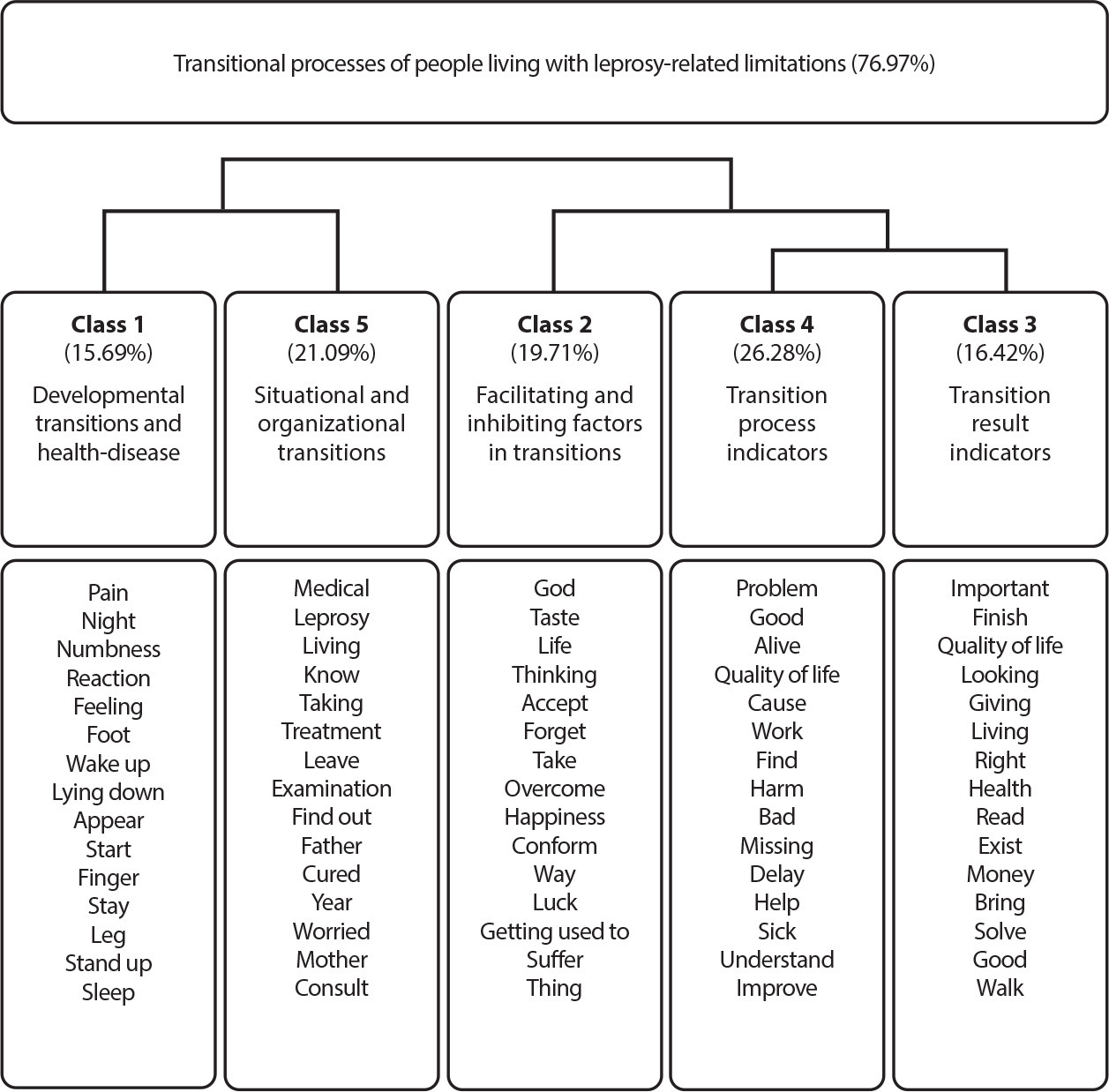
-
11-22-2024
Percepções de pessoas com deficiência física sobre acessibilidade e condições sociais: intervenções para enfermagem de reabilitação
Revista Brasileira de Enfermagem. 2024;77(5):e20240005
Abstract
Percepções de pessoas com deficiência física sobre acessibilidade e condições sociais: intervenções para enfermagem de reabilitação
Revista Brasileira de Enfermagem. 2024;77(5):e20240005
DOI 10.1590/0034-7167-2024-0005
Views0See moreRESUMEN
Objetivos:
analizar las experiencias de personas con discapacidad física adquirida en cuanto a accesibilidad y condiciones sociales; identificar intervenciones de rehabilitación dirigidas por enfermeras para la accesibilidad y condiciones sociales; determinar indicadores sensibles a la enfermería para mejorar la accesibilidad y condiciones sociales.
Métodos:
estudio cualitativo descriptivo-exploratorio utilizó entrevistas semiestructuradas con personas con discapacidad física adquirida mediante muestreo intencionado en bola de nieve para cumplir con todos los objetivos. El análisis de datos siguió los principios del análisis de contenido de Bardin. Los objetivos 2 y 3 se lograron mediante un enfoque teórico reflexivo.
Resultados:
los 27 participantes informaron desafíos de accesibilidad, que impactan las actividades de la vida diaria y las condiciones sociales. Esto influye en la enfermería de rehabilitación, dando lugar a tres campos de intervención: Evaluar la capacidad para realizar actividades diarias y los factores que influyen; Desarrollar e implementar capacitación para la realización de actividades diarias; Promover la movilidad, la accesibilidad y la participación social.
Consideraciones Finales:
a partir de las experiencias de los participantes, identificamos intervenciones de rehabilitación dirigidas por enfermeras para promover la accesibilidad y condiciones sociales.
-
ORIGINAL ARTICLE11-22-2024
Sociodemographic and occupational influences on health professionals’ quality of life
Revista Brasileira de Enfermagem. 2024;77(4):e20240010
Abstract
ORIGINAL ARTICLESociodemographic and occupational influences on health professionals’ quality of life
Revista Brasileira de Enfermagem. 2024;77(4):e20240010
DOI 10.1590/0034-7167-2024-0010
Views0See moreABSTRACT
Objective:
To analyze the sociodemographic and occupational influences on health professionals’ quality of life.
Method:
This descriptive-exploratory, cross-sectional, analytical, and quantitative study addressed 94 health workers, including nursing technicians, nurses, and physical therapists working in Intensive Care Units in a town in the extreme south of Brazil in 2023. The student’s t-test and Spearman correlation were used.
Results:
A significant positive correlation was found between being a woman and the psychological domain and between income and the social and environmental domain while working hours were inversely related to general QoL. Additionally, workload negatively impacted the physical, psychological, and general QOL, furniture negatively influenced the psychological domain, and equipment was negatively associated with the physical and psychological domain.
Conclusion:
The characteristics of the work environment interfere with several areas of quality of life.
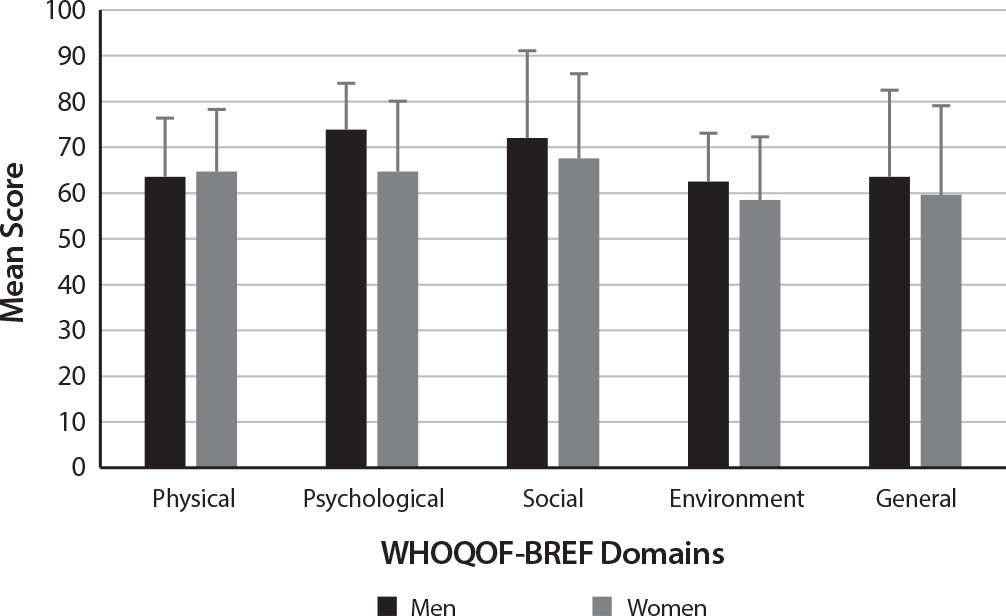
-
REVIEW11-22-2024
Concept analysis of youth: understanding the plurality of subjects
Revista Brasileira de Enfermagem. 2024;77(4):e20240002
Abstract
REVIEWConcept analysis of youth: understanding the plurality of subjects
Revista Brasileira de Enfermagem. 2024;77(4):e20240002
DOI 10.1590/0034-7167-2024-0002
Views0See moreABSTRACT
Objective:
To analyze the concept of “youth.”
Methods:
This is a concept analysis guided by the method proposed by Walker and Avant, operationalized through an integrative literature review. The search in scientific databases was carried out using the descriptors: youth; young; adolescence. To compose the literary corpus, 22 studies were selected.
Results:
Various factors were found in the antecedents that influence the separation of youth groups, contributing to the heterogenization of this population. The attributes include characteristics that comprise the formation of youth groups, especially the idea of shared experiences and social construction, as well as the consequences of the mentioned concept. After systematizing the variables, the analysis was conducted, highlighting the conceptions that influence youth.
Conclusion:
The study demonstrated the multifactorial complexity of the formulation of the concept of youth, highlighting various factors that contribute to this construction. For nursing, this conceptual field allows for an understanding of the population and effective engagement with this group.
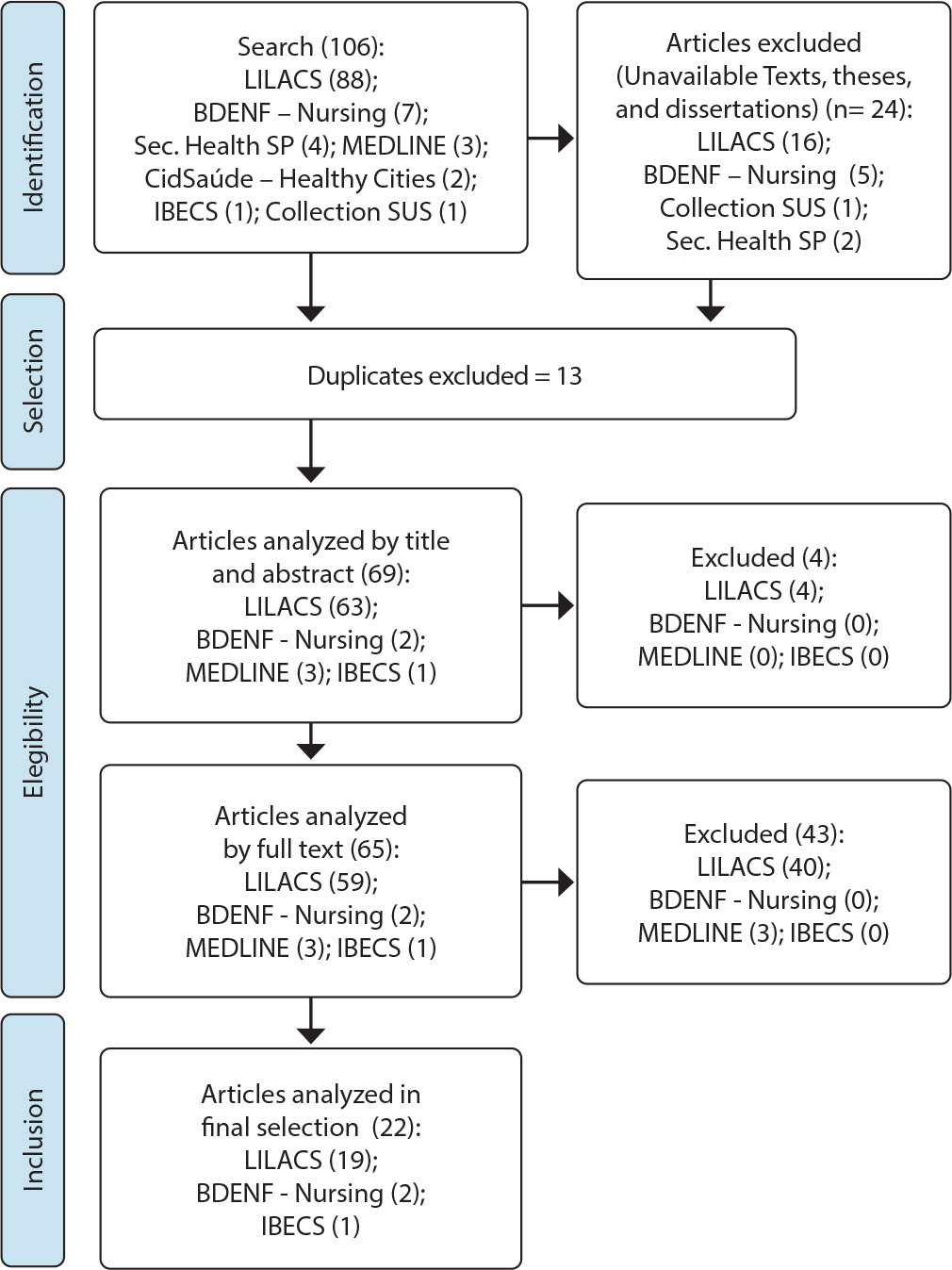
-
ORIGINAL ARTICLE11-22-2024
Temporal trends in neonatal mortality in Pernambuco
Revista Brasileira de Enfermagem. 2024;77(4):e20230451
Abstract
ORIGINAL ARTICLETemporal trends in neonatal mortality in Pernambuco
Revista Brasileira de Enfermagem. 2024;77(4):e20230451
DOI 10.1590/0034-7167-2023-0451
Views0See moreABSTRACT
Objective:
To verify the temporal trend of neonatal mortality in the health regions of Pernambuco between 2000 and 2020.
Method:
A time-series ecological study was conducted, analyzing the total neonatal mortality rate and its early and late components. For regression analysis, Joinpoint Regression was applied, trends were classified, and annual and average percentage changes were calculated for the period, with a significance level of 95%.
Results:
The average neonatal mortality rate in Pernambuco was 11.5 during the studied period. A decreasing trend in neonatal mortality rate was observed, especially in the early component. The region where the state capital is located showed the fastest decrease across all components.
Conclusion:
The temporal trend of neonatal mortality was decreasing; however, the rate of reduction was not uniform across the health regions of the state, and the implementation of the Mãe Coruja Pernambucana Program did not impact the trend in neonatal mortality.
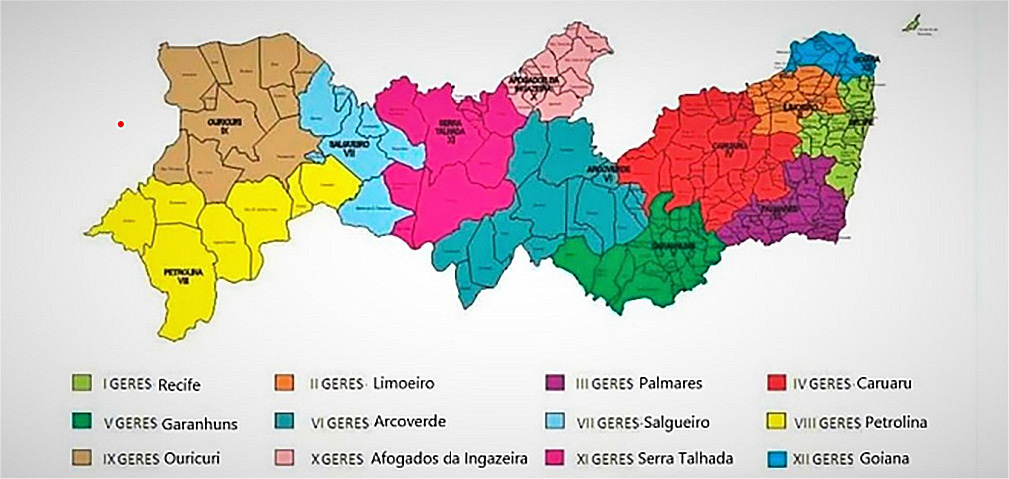
-
ORIGINAL ARTICLE11-22-2024
Evaluation of a video to promote HIV testing in sexual minorities
Revista Brasileira de Enfermagem. 2024;77(4):e20230320
Abstract
ORIGINAL ARTICLEEvaluation of a video to promote HIV testing in sexual minorities
Revista Brasileira de Enfermagem. 2024;77(4):e20230320
DOI 10.1590/0034-7167-2023-0320
Views0See moreABSTRACT
Objective:
To design and evaluate an educational video aimed at promoting HIV testing in gay men from the theoretical perspective of the Nola J. Pender Health Promotion Model.
Methods:
The design comprised five steps: 1.- Literature search; 2.- Formulation of the educational objective; 3.- Drafting of the script and location of the information in the theoretical components; 4.- Production; and 5.- Evaluation by experts and the target population.
Results:
The video “Living Without Fear” was produced, which presents the dilemma faced by gay men before taking a HIV test. The content validity index was 0.85, which indicated that the information was adequate and acceptable for promoting the rapid HIV test.
Final Considerations:
The results contribute to the scientific evidence aimed at promoting healthy behavior. In addition, the video was shown to be an acceptable educational tool.
-
ORIGINAL ARTICLE11-22-2024
Development and validity of a mobile application prototype for hospital shift handover
Revista Brasileira de Enfermagem. 2024;77(4):e20230173
Abstract
ORIGINAL ARTICLEDevelopment and validity of a mobile application prototype for hospital shift handover
Revista Brasileira de Enfermagem. 2024;77(4):e20230173
DOI 10.1590/0034-7167-2023-0173
Views0See moreABSTRACT
Objective:
To develop and validate a mobile application prototype for nursing shift handover in a hospital inpatient unit.
Methods:
A methodological study of technological production, carried out from April 2020 to January 2022, for mobile application construction and validity through the Design Thinking methodology. The study involved the stages of prototype development and validity by experts.
Results:
The application for mobile nursing shift handover obtained a usability score of 79 points and a content validity coefficient of 0.7.
Conclusions:
The instrument obtained an excellent assessment according to usability and agreement among experts. However, future studies are needed to implement this technology in order to assess effectiveness, time optimization and failures during communication.

-
ORIGINAL ARTICLE10-25-2024
Analysis of the vaccination situation against Mpox in people living with HIV/AIDS: an ecological study
Revista Brasileira de Enfermagem. 2024;77(5):e20230234
Abstract
ORIGINAL ARTICLEAnalysis of the vaccination situation against Mpox in people living with HIV/AIDS: an ecological study
Revista Brasileira de Enfermagem. 2024;77(5):e20230234
DOI 10.1590/0034-7167-2023-0234
Views0See moreABSTRACT
Objectives:
to analyze the vaccination situation against Mpox in people living with HIV/AIDS in Brazil.
Methods:
an ecological study on the vaccination status against Mpox in people living with HIV/AIDS (PLWHA) in Brazil. The data were collected in April 2023 through information from the Ministry of Health, using the “Microsoft app Power BI,” which is publicly accessible.
Results:
the data analysis revealed that in Brazil, 2,978 doses of the MVA-BN Jynneos Mpox vaccine were administered in PLWHA, resulting in a vaccination coverage of 18.3%, with the southern and southeastern regions showing the lowest and highest vaccination coverage, respectively. Gender-based evaluation showed a higher proportion of vaccinated males.
Conclusions:
we identified low vaccination coverage in all regions of Brazil, highlighting the need for intensified vaccination activities, especially for PLWHA.
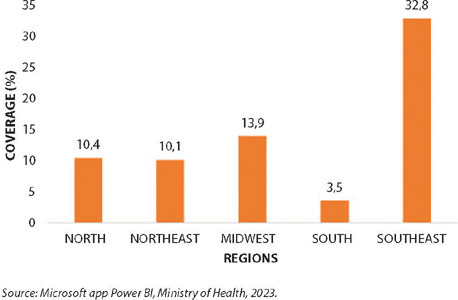
Search
Search in:
Nuvem de Tags
Enfermagem (930)Cuidados de Enfermagem (269)Atenção Primária à Saúde (239)Idoso (208)Educação em Enfermagem (151)Segurança do Paciente (150)Saúde Mental (145)Educação em Saúde (139)Estudos de Validação (131)Qualidade de Vida (104)Tecnologia Educacional (100)Promoção da Saúde (99)COVID-19 (91)Criança (91)Família (87)Enfermagem Pediátrica (86)Saúde do Trabalhador (86)Adolescente (85)Saúde Pública (82)Estudantes de Enfermagem (77)




